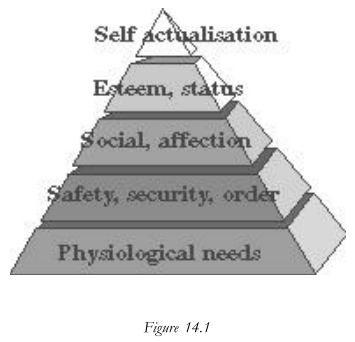Behavioral research studies show that all human activity- including the salesperson’s job behavior-is directed toward satisfying certain needs (that is, reaching certain goals). Patterns of individual behavior differ because individuals seek to fulfill different sets of needs in different ways. Some salespersons, in other words, are more successful than others because of the differing motivational patterns and amounts and types of efforts they exert in performing their jobs.
How particular individuals behave depends upon the nature of their fulfilled and unfulfilled needs modified by their environmental and social backgrounds.
Needs are either primary or secondary.
Primary needs are the inborn or physiological needs for food, water, rest, sleep, air to breathe, sex, and so on, the fulfillment of which are basic to life itself. Until primary needs are satisfied, other needs have little motivational influence.
Secondary needs arise from an individual’s interaction with the environment, and are not inborn but develop with maturity. Secondary needs include those for safety and security, belonging- ness and social relations, and self-esteem and self-respect.
Hierarchy of Needs
A .H. Maslow, a psychologist, developed a theory of motivation based on the notion that an individual seeks to fulfill personal needs according to some hierarchy of importance. He suggests the general priority of need fulfillment shown in Figure 14.1
- Physiological: Like needs for shelter, hunger, thirst, sex and other bodily needs.
- Security: Needs for protection and safety from emotional and physical harm.
- Social: Needs like friendship, accompany, acquisitions.
- Esteem: Internal esteem factor like self respect, autonomy, and achievement and external factors like status, recognition, and attention.
- Self actualization: The drive to become what one is capable of becoming includes growth, and self fulfillment Maslow suggests that after an individual gratifies basic physic logical needs, he or she proceeds to strive to fulfill safety and security needs, then belongingness and social relations needs, and so on the individual’s level of aspiration rising as needs on higher levels are satisfied.
Not every individual and certainly not every salesperson, of course, establishes the order of priority of need fulfillment suggested by Maslow. Some sales personnel, for instance, appear to assign earlier priority to filling the esteem need (for self respect) than they do to filling the need for social relation within a group.
After meeting basic physiological needs, it probably is impossible for most individuals to satisfy fully their needs on any higher level needs seem to multiply along with efforts to satisfy them. As a particular need is satisfied, it loses its potency as’ a motivator, but other unfulfilled needs, some of them new, gain in potency. Individuals continually try to fulfill ever-larger portions of their need structures, and the unsatisfied portions exert the strongest motivational pull.
What, then, motivates salespeople?
Salespersons’ motives for working vary according to the nature and potency of the unsatisfied portion of their individual hierarchies of needs. We must also recognize, however, that some of the salespeople’s needs are filled off the job as well as on it. One salesperson works because of the need for money to feed a family; another because the job is seen as a means for gaining esteem of others; still another because of a need to achieve (self-actualization) to the maximum of one’s abilities, seeing job performance as a means to that end.
If sales management knew the makeup of the unsatisfied portion of a salesperson’s hierarchy of needs at a particular time, it could determine the best incentives.
The fact that an individual has needs causes him or her, consciously or not, to formulate goals in terms of them. If management can harmonize the individual’s goals with those of the organization, then individual behavior is channeled along lines aimed at achieving both sets of goals.
For a salesperson worried about providing for a child’s education, an important individual goal becomes that of obtaining money to remove the uncertainty. If management sees how furnishing the salesperson with an opportunity to earn more money will also further the attainment of organizational goals (perhaps that of increasing the size of orders), then offering the salesperson the chance to earn more money for obtaining larger orders is a powerful incentive.

Money, however, loses its power as an incentive once the individual has gratified physiological needs and most safety and security needs. Other incentives (for example, a chance for promotion, which is one way to fulfill esteem and self-respect needs) become increasingly effective. The promise of more money becomes a weaker incentive the farther up in the hierarchy an individual’s unfulfilled needs are pushed. Whatever power a larger income retains is related to unfulfilled esteem and self actualization needs and the extent to which income can gratify them. Of course, too, the threat of receiving a lower income, a negative incentive, endangers the fulfilled part of an individual’s need structure, and to the extent that this threat exist, money continues to have power as an incentive.
Notice that whereas motives are internal to the individual, incentives are external. Sales management influences the behavioral patterns of sales personnel indirectly through the incentives it offers.

